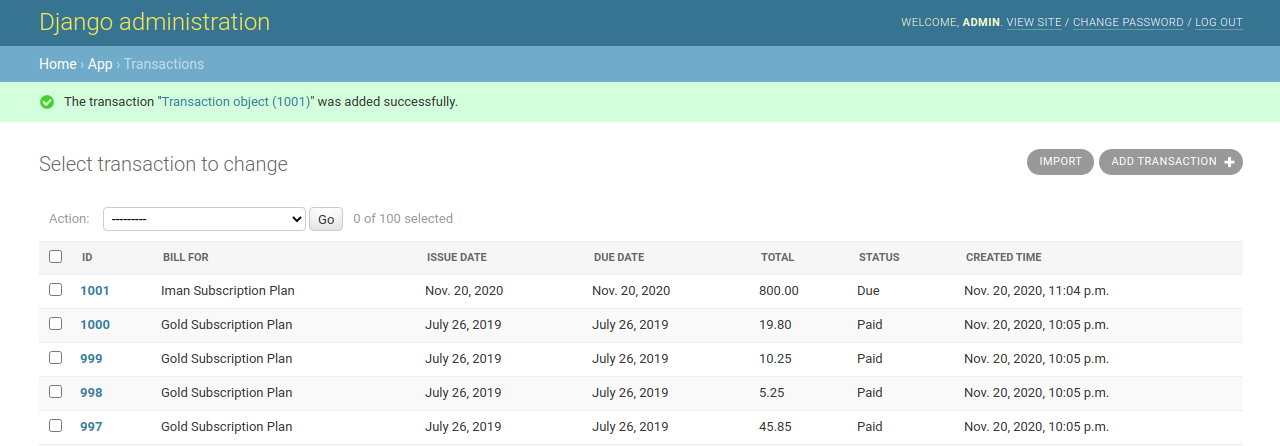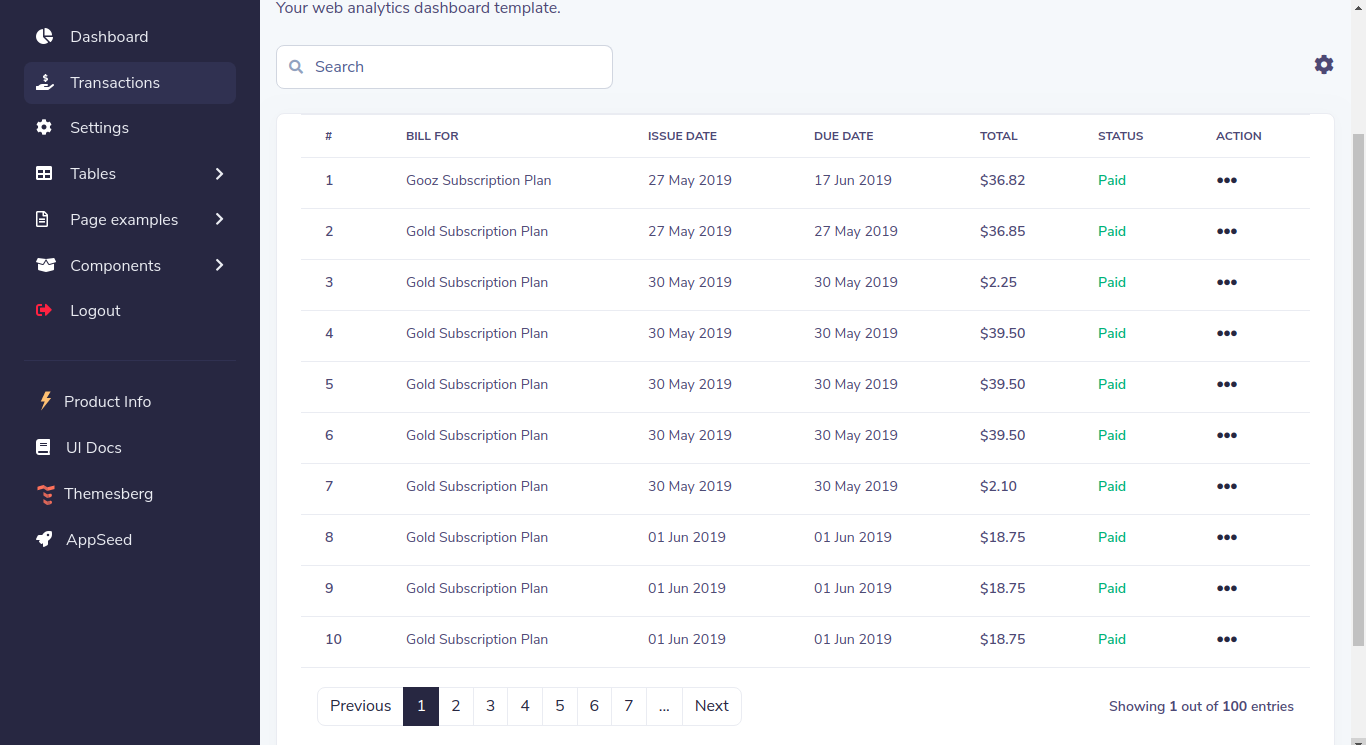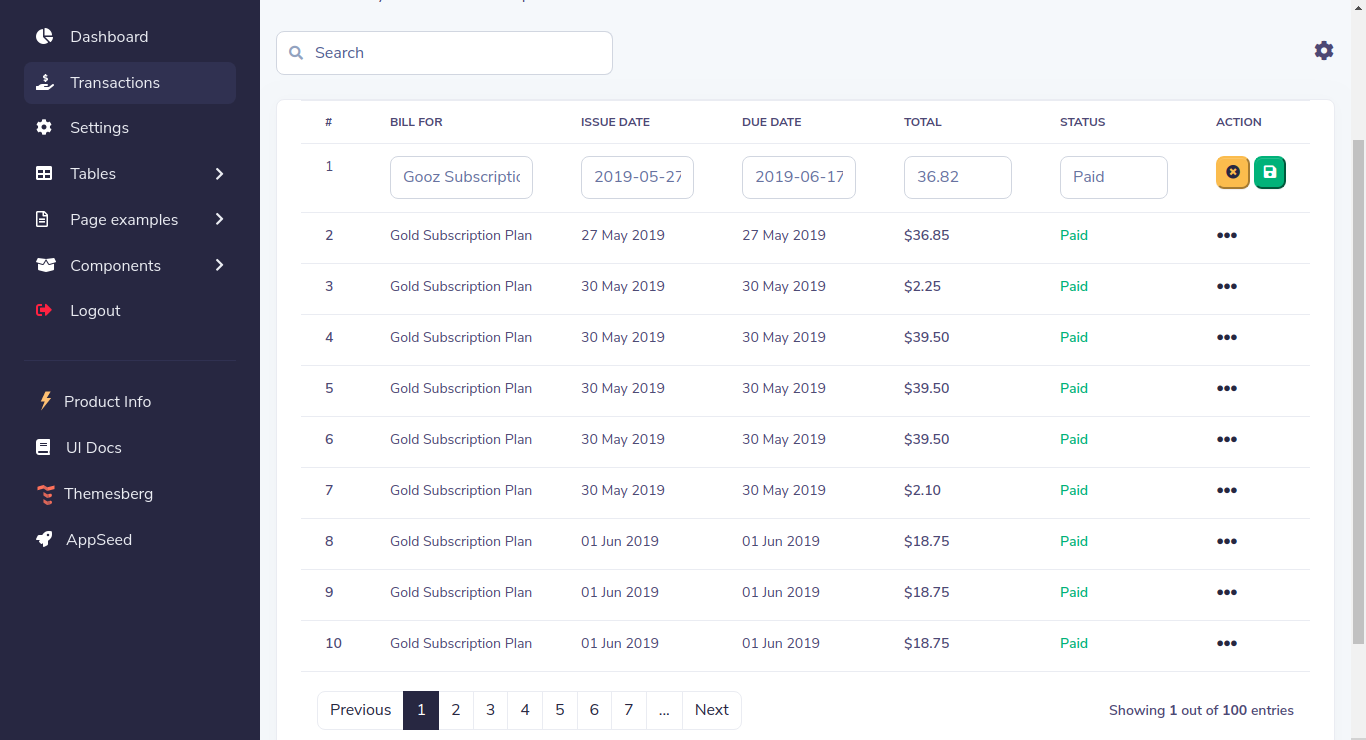https://github.com/app-generator/sample-django-datatables
Django - Datatables Sample | AppSeed
https://github.com/app-generator/sample-django-datatables
django-bootstrap django-bootstrap-sample django-bs5-design django-coding-sample django-datatables django-datatables-serverside django-sample django-sample-tables django-tables django-volt-design python-coding python-coding-solutions
Last synced: 9 months ago
JSON representation
Django - Datatables Sample | AppSeed
- Host: GitHub
- URL: https://github.com/app-generator/sample-django-datatables
- Owner: app-generator
- License: other
- Created: 2020-11-14T15:39:35.000Z (about 5 years ago)
- Default Branch: master
- Last Pushed: 2024-10-17T03:41:40.000Z (about 1 year ago)
- Last Synced: 2025-03-29T19:03:23.398Z (9 months ago)
- Topics: django-bootstrap, django-bootstrap-sample, django-bs5-design, django-coding-sample, django-datatables, django-datatables-serverside, django-sample, django-sample-tables, django-tables, django-volt-design, python-coding, python-coding-solutions
- Language: CSS
- Homepage: https://django-datatables-sample.appseed.us
- Size: 6.9 MB
- Stars: 90
- Watchers: 7
- Forks: 33
- Open Issues: 3
-
Metadata Files:
- Readme: README.md
- Changelog: CHANGELOG.md
- License: LICENSE.md
Awesome Lists containing this project
README
# Django Datatables Sample
Simple Django starter that implements a server-side paginated view - Styled with Bootstrap 5.
- 👉 Demo: https://django-datatables-sample.appseed.us/
---
> For a **complete set of features** and long-term support, check out **[Dynamic Django](https://app-generator.dev/docs/developer-tools/dynamic-django/index.html)**, a powerful starter that incorporates:
- ✅ [Dynamic DataTables](https://app-generator.dev/docs/developer-tools/dynamic-django/datatables.html): using a single line of configuration, the data saved in any table is automatically managed
- ✅ [Dynamic API](https://app-generator.dev/docs/developer-tools/dynamic-django/api.html): any model can become a secure API Endpoint using DRF
- ✅ [Dynamic Charts](https://app-generator.dev/docs/developer-tools/dynamic-django/charts.html): extract relevant charts without coding all major types are supported
- ✅ [CSV Loader](https://app-generator.dev/docs/developer-tools/dynamic-django/csv-loader.html): translate CSV files into Django Models and (optional) load the information
- ✅ Powerful [CLI Tools](https://app-generator.dev/docs/developer-tools/dynamic-django/cli.html) for the GIT interface, configuration editing, updating the configuration and database (create models, migrate DB)
## How to use it
```bash
$ # Get the code
$ git clone https://github.com/app-generator/django-datatables-sample.git
$ cd django-datatables-sample
$
$ # Virtualenv modules installation (Unix based systems)
$ virtualenv env
$ source env/bin/activate
$
$ # Virtualenv modules installation (Windows based systems)
$ # virtualenv env
$ # .\env\Scripts\activate
$
$ # Install modules - SQLite Storage
$ pip3 install -r requirements.txt
$
$ # Create tables
$ python manage.py makemigrations
$ python manage.py migrate
$
$ # Create app superuser
$ python manage.py createsuperuser
$
$ # Start the application (development mode)
$ python manage.py runserver # default port 8000
$
$ # Start the app - custom port
$ # python manage.py runserver 0.0.0.0:
$
$ # Access the web app in browser: http://127.0.0.1:8000/
```
> Note: To use the app, please access the registration page and create a new user. After authentication, the app will unlock the private pages.
## Load Data For Datatable
In Django admin, you can import data for the **Transaction** section.
To do this just click on ```IMPORT``` button then select your csv, xls or etc file and submit it.

> Sample **[Data](https://github.com/app-generator/django-datatables-sample/blob/master/sample_data/transactions_data.csv)**
### Datatable for transactions
* Imported information is displayed in the **Transactions** section.

* In this section, you can *search*, *edit*, and *delete* the transactions. The added features of this **datatable** are:
- Paginated information (transaction page) with usable controls: PREV, 1,2,3., NEXT
- Search box to filter
- Delete row control
- edit cel data on double click and ENTER on confirm.

## Code-base structure
The project is coded using a simple and intuitive structure presented bellow:
```bash
< PROJECT ROOT >
|
|-- core/ # Implements app logic and serve the static assets
| |-- settings.py # Django app bootstrapper
| |-- wsgi.py # Start the app in production
| |-- urls.py # Define URLs served by all apps/nodes
| |
| |-- static/
| | |-- # CSS files, Javascripts files
| |
| |-- templates/ # Templates used to render pages
| |
| |-- includes/ # HTML chunks and components
| | |-- navigation.html # Top menu component
| | |-- sidebar.html # Sidebar component
| | |-- footer.html # App Footer
| | |-- scripts.html # Scripts common to all pages
| |
| |-- layouts/ # Master pages
| | |-- base-fullscreen.html # Used by Authentication pages
| | |-- base.html # Used by common pages
| |
| |-- accounts/ # Authentication pages
| | |-- login.html # Login page
| | |-- register.html # Register page
| |
| index.html # The default page
| page-404.html # Error 404 page
| page-500.html # Error 404 page
| *.html # All other HTML pages
|
|-- authentication/ # Handles auth routes (login and register)
| |
| |-- urls.py # Define authentication routes
| |-- views.py # Handles login and registration
| |-- forms.py # Define auth forms
|
|-- app/ # A simple app that serve HTML files
| |
| |-- views.py # Serve HTML pages for authenticated users
| |-- urls.py # Define some super simple routes
|
|-- requirements.txt # Development modules - SQLite storage
|
|-- .env # Inject Configuration via Environment
|-- manage.py # Start the app - Django default start script
|
|-- ************************************************************************
```
> The bootstrap flow
- Django bootstrapper `manage.py` uses `core/settings.py` as the main configuration file
- `core/settings.py` loads the app magic from `.env` file
- Redirect the guest users to Login page
- Unlock the pages served by *app* node for authenticated users
## Deployment
The app is provided with a basic configuration to be executed in [Docker](https://www.docker.com/), [Gunicorn](https://gunicorn.org/), and [Waitress](https://docs.pylonsproject.org/projects/waitress/en/stable/).
### [Docker](https://www.docker.com/) execution
---
The application can be easily executed in a docker container. The steps:
> Get the code
```bash
$ git clone https://github.com/app-generator/django-datatables-sample.git
$ cd django-datatables-sample
```
> Start the app in Docker
```bash
$ docker-compose up --build
```
Visit `http://localhost:5085` in your browser. The app should be up & running.
---
[Django Datatables Sample](https://django-datatables-sample.appseed.us/) - Provided by [AppSeed](https://appseed.us).